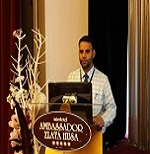Showkat Hussain Tali
AIMSR, India
Title: Effect of Feeding Schedule on Time To Reach Full Feeds in neonates weighing 500 to 1500 grams: A Randomized Trial

Biography:
Showkat Hussain Tali is working as an Assistant Professor of Pediatrics, Adesh University. After obtaining his Bachelor's Degree in 2005, he obtained his MD in Pediatric Medicine from University of Kashmir in 2010. In 2013 he joined Department of Neonatology Surya Children’s Hospital Mumbai and became Board Certified in Neonatology from the National Board of India in 2016. In the same year he joined Adesh University as Assistant Professor Pediatrics and In-charge Neonatology. He has more than a dozen publications in national and international journals. He has received science talent search award from the Govt. of Jammu and Kashmir in 1997. He is also keenly interested in poetry and creative writing and has been awarded by Help Foundation and Rajiv Gandhi foundation, India, for excellence in creative writing in 2007.
Abstract:
Aim: To compare the effect of 3-hourly (3-h) versus 2-hourly (2-h) feeding schedules on time to reach full feeds in neonates weighing less than 1500 grams
Materials & Methods: This was a randomized trial conducted in a level 3 neonatal intensive care unit, Surya Children’s Hospital Mumbai, India. We enrolled 120 preterm neonates with birth weights of 501 to 1500 g. The neonates were divided into 2 strata based on birth weight: 501 to 1000 g and 1001 to 1500 g. The neonates were randomized into 2 orogastric feeding schedules: 8 or 12 feeds (3-h or 2-h schedules, depending upon randomization), and a uniform feeding protocol was followed. Analysis was performed using the intention-to-treat principle. Categorical variables were compared using the Chi-square test. Continuous measures between groups were compared using 2-sample t test or Mann Whitney U test as appropriate. Data were analyzed using IBM SPSS version 21 software. P<0.05 was considered significant.
Primary Outcome measures were time (in days) to reach full feeds (defined as tolerance of 150 mL/kg/d of feeds for at least 48 h).
Secondary Outcome measures were time (in days) to attain birth weight; time (in days) to discharge; weight, length, and head circumference at discharge; incidence of feed intolerance, necrotizing enterocolitis (NEC), intravascular hemorrhage (IVH), screen-positive sepsis, culture-positive sepsis, hypoglycemia, apnea, jaundice and retinopathy of prematurity (ROP), duration of total parental nutrition (TPN) and nursing; and mortality.
Results: A total of 215 neonates were assessed for eligibility, of which 95 were excluded. Hence, 120 neonates were enrolled in the trial. There was no significant difference in time (in days) to reach full feeds in the 2-h versus 3-h groups (9.53±4.26 vs. 9.85±5.48; P=0.73). There was no significant difference between the 2 groups in any of the secondary outcomes. The total time spent per day in feeding was significantly lesser in the 3-h feeding schedule groups (P=0.04).
Subgroup Analysis revealed that among the neonates in the lower birth weight strata (501 to 1000 g), those fed 2 hourly reached full feeds earlier compared with those fed 3-hourly (2-h group: 11.24±2.88 d vs. 3-h group: 14.14±4.98 d; P=.041).
Conclusions: There was no significant difference in time to reach full feeds in all the neonates, irrespective of whether they were fed 2-h or 3-h. However, neonates < 1000 g reached full feeds earlier when fed more frequently (2-h feeding schedule).